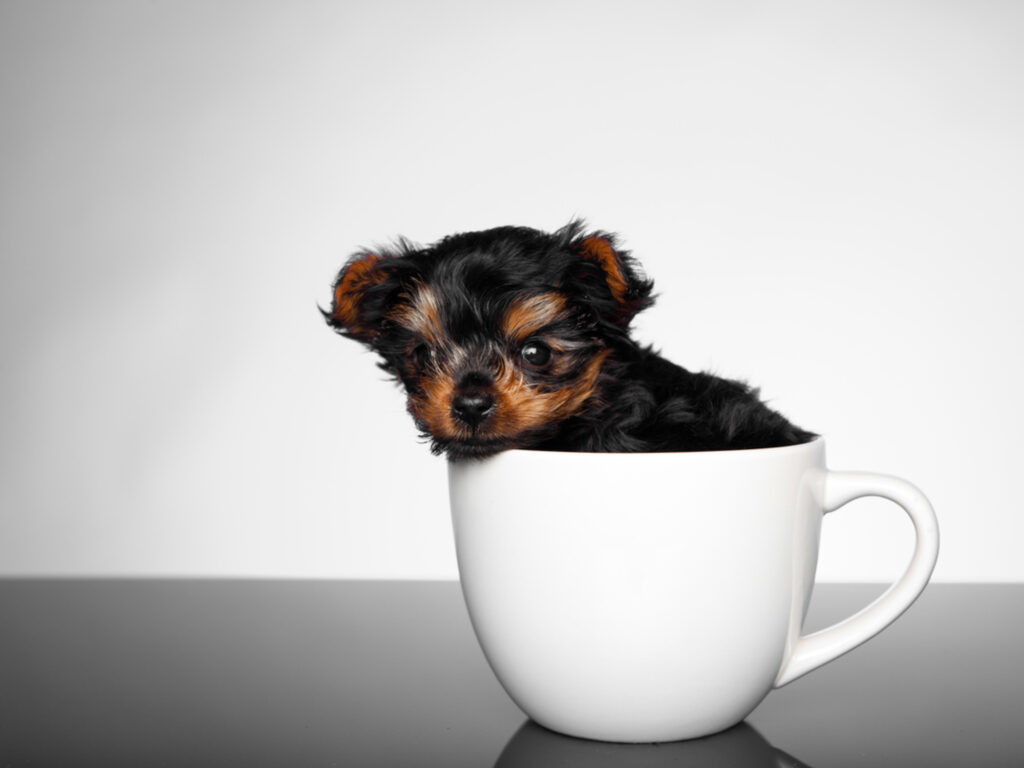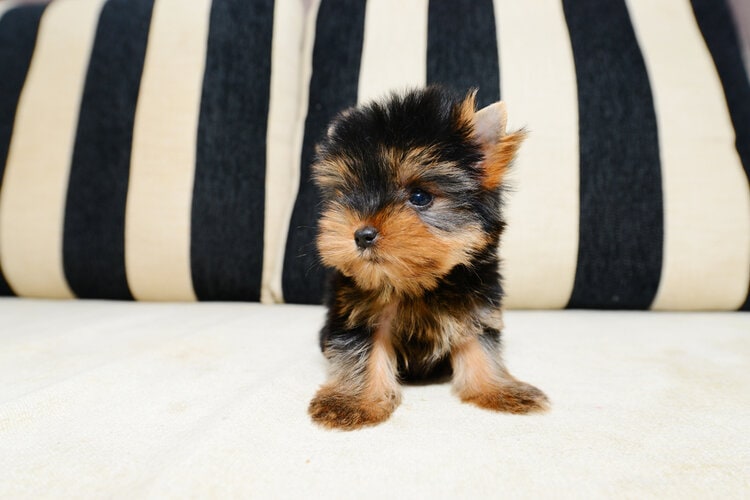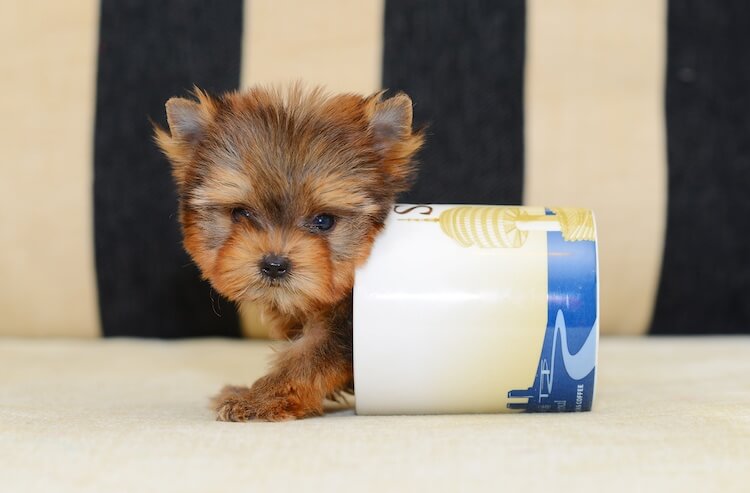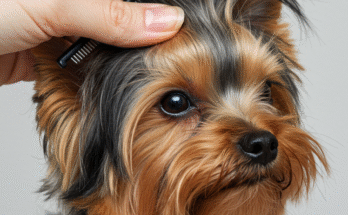
Tiny, Fluffy, and Full of Personality: The Teacup Yorkie
The Teacup Yorkie is a pint-sized pup with a big personality. These irresistibly cute dogs are simply Yorkshire Terriers bred to be much smaller than the standard size. Typically weighing between 2 to 4 pounds—and occasionally up to 7—they’re designed to be ideal apartment pets, lapdogs, and loyal companions. In this guide, we’ll explore the pros and cons of bringing a Teacup Yorkie puppy into your home and help you decide if this tiny but confident breed is the right fit for your lifestyle, family, kids, and other pets.
Contents
- What Are Teacup Yorkies?
- How Much Do Teacup Yorkies Cost?
- Teacup Yorkie Health & Lifespan
- All About Teacup Yorkie Puppies
The Rise of Teacup Dogs: Tiny Companions with Big Appeal
Small dogs and toy breeds have long been favorites among dog lovers—and it’s easy to see why. Their compact size, adorable looks, and affectionate nature make them especially appealing to first-time pet parents. In recent years, even smaller variations—known as mini, micro, or “teacup” breeds—have surged in popularity. However, while these pint-sized pups are undeniably cute, their extra-small size can come with health challenges, including fragile bones, bladder issues, and other concerns related to their delicate build.

What Is a Teacup Yorkie?
A Teacup Yorkie is a miniature version of the traditional Yorkshire Terrier, selectively bred to be much smaller than the breed standard. While standard Yorkies typically weigh up to seven pounds, Teacup Yorkies often weigh between two and four pounds. Despite their tiny size, they still carry the bold, spirited personality the breed is known for—just in a much smaller package.
Many pet Yorkies end up weighing slightly more than the breed standard, but they’re still undeniably small dogs. However, when an already tiny toy breed like the Yorkshire Terrier is further miniaturized, the result is an exceptionally petite pup. Teacup Yorkies take small to the next level—often fitting comfortably in the palm of your hand.
Why Are They Called Teacup Yorkies?
The name “Teacup Yorkie” comes from their incredibly small size—some are tiny enough to literally fit inside a teacup. These miniature pups typically weigh between two and four pounds, making them one of the smallest varieties of dogs around.
It’s important to note that Teacup Yorkies aren’t a separate breed. They are usually pedigree Yorkshire Terriers that have been selectively bred to be much smaller than average. Despite their petite appearance, they are still officially registered as Yorkshire Terriers—just like their standard-sized counterparts.
The Teacup Dog Controversy
While Teacup Yorkies are undeniably adorable, their popularity is not without controversy. The practice of breeding already small toy breeds into even smaller “teacup” versions has sparked criticism from many in the animal welfare and veterinary communities.
Teacup dogs aren’t limited to Yorkies—other toy breeds like Chihuahuas, Pomeranians, and Maltese have also been miniaturized. Critics argue that this trend prioritizes appearance over health, as extreme miniaturization can increase the risk of health issues like fragile bones, organ problems, and a shorter lifespan.
So if you’re thinking about bringing a Teacup Yorkie home, it’s not only wise to understand the potential health challenges—they’re also a topic that can spark strong opinions. And while your choice of pup is personal, it’s helpful to be informed about the wider debate.
Why Are Mini Yorkies So Appealing?
So why do we find tiny dogs so irresistible? There are a couple of key reasons. One is rooted in our natural instinct to nurture. The other ties into a biological concept called neoteny—the retention of baby-like traits into adulthood.
Neoteny in Dogs
Neoteny refers to features like large eyes, small size, and rounded faces—traits that remind us of babies. These features trigger our deep-rooted nurturing instincts, making us want to protect and care for these tiny creatures. It’s a powerful emotional response that’s wired into our biology.
When we see a very small dog, especially one with exaggerated puppy-like features, our brains respond just as they would to a human infant. It’s not being “soft” or “silly”—it’s simply part of what makes us human.
Of course, the appeal of Teacup Yorkies isn’t just about neoteny. There’s more to their charm than just looking like a living plush toy—but it definitely plays a big role in why we love them.

The Magic of Miniaturization
The idea of shrinking something to miniature proportions has always held a special kind of magic. From classic literature to modern sci-fi, the concept of tiny worlds and shrunken characters has captured imaginations for generations. Just think of the Lilliputians in Gulliver’s Travels, or the miniature adventures in The Borrowers.
Like many others growing up, I was captivated by these tales. I was equally enchanted by real-life miniatures—tiny Shetland ponies, delicate Chihuahuas, and later, watching my own children marvel at pygmy hippos at the zoo or the wonder of The Indian in the Cupboard.
There’s something undeniably magical about miniaturization. It fascinates us, stirs our imagination, and tugs at our nurturing instincts. It’s no wonder that, with the ability to shape dog breeds over generations, we’ve used that power to create ever-smaller canine companions.
Because let’s face it—there’s something both extraordinary and delightful about a creature as tiny as a Teacup Yorkie still carrying all the spirit, personality, and charm of a full-sized dog. It’s thrilling, really. Almost like holding a living fairytale in the palm of your hand.
Micro Teacup Yorkie – How Small Is Too Small?
We humans have a knack for pushing boundaries—and when it comes to tiny dogs, that drive is no different. All over the internet, people search for ever-smaller versions of the already petite Teacup Yorkie. Enter the so-called Micro Teacup Yorkie—a term used to describe dogs that are allegedly even tinier than their teacup counterparts.
But here’s the catch: there’s no official definition for “micro” or even “teacup.” These labels are often used by breeders and sellers without any standardized guidelines, which means the terminology can vary wildly. And that raises an important question: just how small can a dog be and still function as a healthy, happy, living, breathing, tail-wagging companion?
At what point does the quest for smallness cross a line? Have we already reached the limit of how tiny a dog can be while still preserving the essence of what it means to be a dog? Or are we still trying to push those boundaries even further?
These are questions that breeders—and prospective dog owners—need to consider carefully. Because while miniature dogs like Micro Teacup Yorkies may seem like adorable marvels of nature, there may be a hidden cost to creating creatures this small. As we continue to explore the appeal of miniaturization, it’s essential to ask whether this trend is truly in the best interest of the dogs themselves.

Is Miniaturization Harmful?
Many people wonder: Is making dogs smaller and smaller actually harmful? Should we be breeding tiny dog breeds to be even tinier? These aren’t easy questions to answer.
Our natural instinct when we see something unbelievably cute—like a palm-sized puppy—is to focus on the appeal and overlook the risks. And yes, there are some very real benefits to owning a small dog. But before we explore the downsides, let’s first look at what makes these tiny pups so appealing.
Benefits of Owning a Tiny Dog
There’s no denying that small dogs offer some practical advantages. They’re easy to carry, require less space, and tend to shed less than their larger counterparts. A dog that can sit comfortably in your lap—or even in your purse—is a convenient and cuddly companion. And despite their size, they still retain all the charm, intelligence, and personality that make dogs such beloved pets.
It’s worth noting, though, that you don’t need a teacup dog to enjoy these perks. Many small toy breeds already provide all these benefits without pushing the limits of extreme miniaturization. And at some point, being “extra tiny” starts to come with serious trade-offs.
If you’ve already fallen in love with the idea of a Teacup Yorkie, you might not want to hear the next part—but it’s important. Being informed helps you make the best decision for both you and your future pup.
Health Problems in Teacup Yorkies
Unfortunately, the list of health issues associated with extreme miniaturization is a long one. Making dogs smaller than nature intended can lead to serious and sometimes lifelong medical problems.
Teacup Yorkies are more likely to suffer from:
- Heart defects
- Liver shunts
- Fragile bones and frequent fractures
- Hydrocephalus (fluid on the brain)
- Hypoglycemia (low blood sugar)
- Weakened immune systems
- Behavioral and psychological issues
These issues occur because shrinking a dog doesn’t just scale down their body—it can affect the development and function of their vital organs. Their tiny hearts and livers may struggle to work as they should, making them more prone to illness and complications.
How Long Do Teacup Yorkies Live?
While a healthy standard Yorkshire Terrier can live between 11 and 15 years, the outlook for teacup versions isn’t as promising. Teacup Yorkies often have shorter lifespans—sometimes just 7 to 9 years—largely due to the health issues linked to their size.
Many teacup puppies are also bred using questionable practices, including inbreeding or breeding from the runt of the litter. These methods can increase the risk of congenital defects and further shorten their lifespan.
Brain and Bone Problems
When we alter the natural proportions of an animal, things don’t always work out as planned. Teacup puppies, including Teacup Yorkies, are particularly susceptible to serious health issues due to their tiny size.
One of the most concerning problems is brain inflammation or a buildup of fluid inside the skull. Teacup dogs may also have soft spots in their skulls—similar to the fontanelle found in human babies. However, unlike human infants, these soft spots never close in teacup dogs, leaving them vulnerable to injury and potential brain damage throughout their lives.
In addition to brain issues, Teacup Yorkies face significant challenges with bone health. Their small, fragile bones are more prone to fractures, even from minor falls or injuries. This heightened vulnerability can result in frequent and severe injuries, especially as they navigate a world that’s simply too big for them.

Teacup Dogs and Mental Health
It turns out that size might not just affect a dog’s physical health—it can also influence their mental well-being. Studies, including one featured by Psychology Today, suggest that small dogs tend to experience more emotional and psychological stress than larger dogs. After all, being a tiny dog in a big world could be quite overwhelming, which may explain why Teacup dogs often show signs of anxiety, fear, and other behavioral issues.
Caring for a Teacup Yorkie
If you’re considering bringing a Teacup Yorkie into your home, it’s crucial to understand the special care requirements that come with owning such a tiny dog.
One of the most important things to keep in mind is that your Teacup Yorkie’s bones are extremely fragile. They can easily suffer injuries from falls, bumps, or even being stepped on. You’ll need to be vigilant, ensuring that your tiny pup doesn’t jump from high surfaces or get too close to small children who might unintentionally cause harm.
Additionally, Teacup Yorkies often have low blood sugar, so they require frequent meals—sometimes as often as once every hour. Without regular feeding, their blood sugar can dip dangerously low, leading to serious health issues.
Another challenge is house training. Due to their small bladders, Teacup Yorkies often struggle with bladder control, which can make potty training much more difficult. Incontinence is also common, so be prepared for some challenges when it comes to training and managing accidents.
Teacup Yorkie Breeders
As we’ve mentioned, poor breeding practices can significantly impact the health of Teacup Yorkies. To achieve a smaller-than-average dog, breeders often select the smallest dogs in a litter to reproduce. Unfortunately, these smaller dogs are often less healthy than their larger siblings, which can perpetuate health problems in subsequent generations.
Because of this, it’s important to be cautious when choosing a breeder. A responsible breeder should prioritize the health and well-being of their dogs, not just the desire for a smaller size.
Instead of prioritizing health when selecting breeding pairs, some breeders focus solely on finding the smallest dogs, regardless of the potential health risks they might pass on to the next generation. The driving factor, as you might expect, is money.
In their pursuit of the tiniest puppies to satisfy the demand for Teacup dogs, these breeders often disregard the long-term health of the animals, thinking only of the profit they can make from selling these miniature pups. This leads us to another important consideration: cost.
Teacup Yorkie Price
Because of the high demand for these tiny dogs, Teacup Yorkie breeders can charge a premium price for their puppies. Reputable breeders who care about the health of their dogs will refuse to compromise on this, but they are few and far between. In fact, some breeders even offer financing options to encourage buyers to spend more on their pups.
Teacup Yorkies aren’t cheap. You can expect to pay upwards of $2,000 for one, and that’s before you even start adding up the costs of ongoing vet care. The high price tag reflects both the demand and the risks associated with breeding such small dogs.
Finding a Healthy Teacup Puppy
Many of the health problems associated with Teacup Yorkies are also present in toy breeds in general. By breeding dogs to be even smaller than average, these problems become more pronounced. Finding a healthy Teacup Yorkie is a real challenge—and many veterinary experts would argue that it’s essentially impossible. The fact is, we don’t yet have the means to miniaturize a dog without compromising its health.
If you’re set on having a Teacup Yorkie, it’s essential to recognize that your tiny companion is likely to be less healthy than a standard-sized dog. This could lead to emotional stress, constant medical bills, and heartache over the years.
A Better Option: Consider Adoption
If after all this, you still want to bring a Teacup Yorkie into your life, consider adopting rather than purchasing. Yorkie rescue organizations often have dogs of all sizes, including smaller ones in need of loving homes. By adopting, you not only give a dog a second chance but also avoid contributing to the demand for expensive, health-compromised Teacup puppies.
Adoption is also far more affordable than buying a puppy from a breeder. Plus, you’ll be offering a loving home to a dog that might otherwise never have had the chance to thrive.



Thank you for your post. I really enjoyed reading it, especially because it addressed my issue. http://www.ifashionstyles.com It helped me a lot and I hope it will also help others.
Thank you for your articles. I find them very helpful. Could you help me with something? http://www.goodartdesign.com
защитная пленка для поверхностей https://www.samokleyushchayasya-plenka-1.ru .
стоимость дизайнерской мебели стоимость дизайнерской мебели .